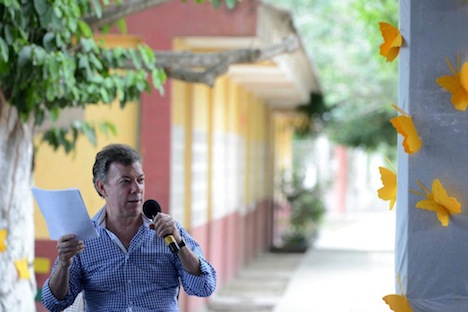7. Colombia presidential election, May 15 (with potential June runoff).![]()
If Colombians went to the polls today, it’s likely they would reelect Juan Manuel Santos, a former defense secretary who came to power in 2010 as the protégé of former Colombian president Álvaro Uribe.
But five months is a long time, especially given that Santos (pictured above) is engaged in high-stakes talks with the longtime guerrilla organization Fuerzas Armadas Revolucionarias de Colombia (FARC), which has waged an insurgency against the Colombian government for nearly half a century. Under the conservative Uribe, Colombia firmly emerged from an era of narcoterrorism and cartel-fueled violence that made the country the top battleground in the US war on drugs throughout the 1990s. Colombia today is enjoying rapid economic growth.
Uribe turned on Santos shortly after his election, and Uribe is staunchly opposed to the Colombian government’s talks with FARC, which kicked off in October 2012. Instead, Uribe is supporting former finance minister Óscar Iván Zuluaga and has formed a new political party, Uribe Centro Democrático (Democratic Center), to challenge Santos.
Santos’s approval rating dropped to 25% in mid-2013, and while it’s slowly recovering ground, he shouldn’t necessarily take reelection for granted. Polls, however, show that Colombians want to stick with Santos — and may resent what they see as Uribe’s attempt to claw his way back into influence over national policy. On the left, none of the three most likely candidates seem to be able to attract enough support to win the presidency, though former Bogotá mayor Enrique Peñalosa might pose the strongest challenge as a business-friendly member of the Partido Verde Colombiano (Colombian Green Party).
One issue that could motivate the Colombian left is the removal of Bogotá mayor and former M-19 rebel Gustavo Petro in December 2013 by Colombia’s inspector general Alejandro Ordóñez, a Uribe ally — ostensibly over the issue of a 2011 clash between Petro and the city’s garbage collectors. With Petro and his allies still protesting the decision, the capital city faces fresh elections as well early in 2014 that could highlight the deficiencies and growing pains of Colombian democracy.
